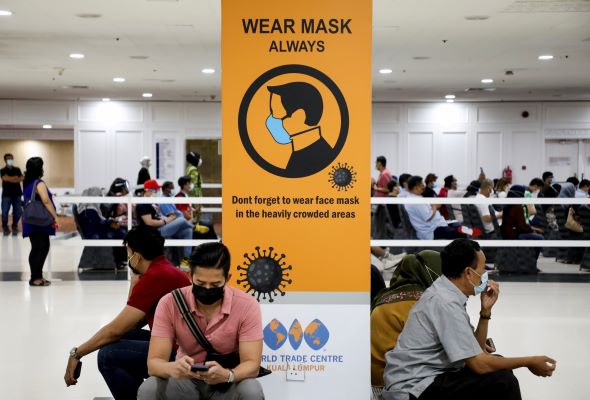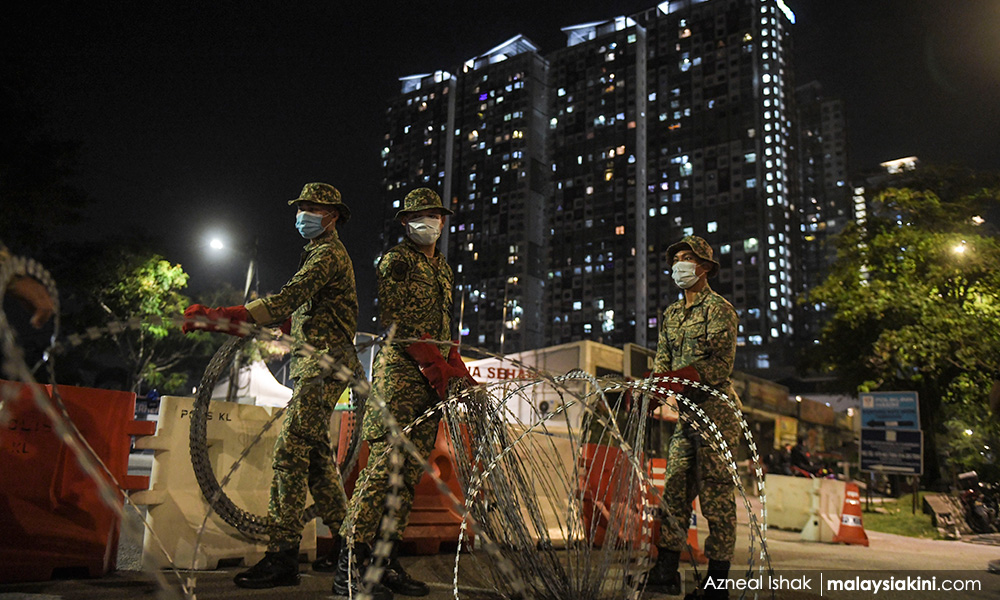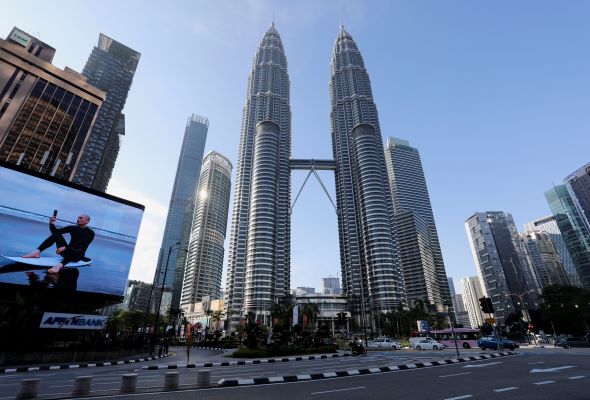
Published in Astro Awani & the Sun daily, image by Astro Awani.
Despite there have been calls for a total country lockdown to deal with the increasing Covid-19 cases in Malaysia, the current administration decided to tighten only the third Movement Control Order (MCO 3.0) standard operating procedures (SOPs) effective from May 25.
However, Prime Minister Tan Sri Muhyiddin Yassin announced a full MCO (FMCO) equivalent to the MCO 1.0 that was announced nationwide in 2020, from Jun 1 until Jun 14 as the daily infection of 8,290 Covid-19 cases was recorded last Friday (May 28).
“Only essential economic and service sectors listed by the National Security Council (NSC) will be allowed to operate during FMCO,” he added.
Since May 19, Malaysia has reported over 6,000 daily new Covid-19 cases for 13 consecutive days. It is a worrying scenario as more transmissible new Covid-19 variants in the community may dampen the Government’s effort to flatten the pandemic curve.
However, as many small and medium enterprises (SMEs) owners and the low-income and vulnerable groups are still struggling to recover from the first and second MCO, the current administration decided to allow businesses classified as essential services to operate.
Businesses in shopping malls that provide goods and services that are of daily necessities, laundries, convenience stores, eateries, roadside stalls and veterinary clinics, for instance, could operate 12 hours a day, which is from 8 am to 8 pm.
To further reduce the people’s movement, 80 per cent of the civil servants (i.e., around 750,000 employees) and 40 per cent of operations and management staffs in the private sector (i.e., approximately 6.1 million employees) must work from home (WFH).
On the other hand, public transport services such as LRT, buses, MRT, ERL, monorail and ferries are limited to only 50 per cent of passenger capacity.
Although private sector employers and small business owners do not prefer to have a total lockdown, a sharp rise in the daily number of Covid-19 cases left the country with no option but introducing FMCO effective from today (Jun 1).
Therefore, there is an increasing concern that a total of 2.8 million high-risk informal workers will lose their source of income when FMCO is introduced. According to Finance Minister Datuk Seri Tengku Zafrul Abdul Aziz, the number of unemployed people could reach one million, which will impact four million people based on an average of four persons per family.
Up till Mar 2021, the government has exhausted a total of RM340 billion in numerous stimulus packages. However, low-income households continue to be affected by unemployment and lower earnings over one year of on-and-off lockdown.
This can be seen in the Klang Valley’s public housing flats, where many low-income families could not afford to buy daily necessities to sustain their livings.
According to the recent findings from the United Nations Children Fund (Unicef) and United Nations Population Fund (UNFPA), more than half of the low-income households in the Klang Valley area are unable to meet essential expenses.
As there is a possibility of the FMCO beyond Jun 14, the government should expedite the provision of additional RM40 billion worth of Pemerkasa (Strategic Programme to Empower the People and Economy Plus) Plus (Pemerkasa+) stimulus package for the tourism sector, SMEs, and the low-income and vulnerable groups to weather through the storm.
The 5MY Programme (i.e., MYJob@Wilayah, MYSchoolBus@Wilayah, MYGrocer@Wilayah, MYFood@ Wilayah and MYMedic@Wilayah) that were introduced by the Ministry of Federal Territories in conjunction with Federal Territory Day 2021 on Feb 1 should be re-introduced.
While ensuring continuous welfare assistance for the citizens based in Federal Territories (Kuala Lumpur, Putrajaya and Labuan), this programme could be expanded to the whole country, especially in less-developed states such as Sabah, Sarawak, Kelantan, Terengganu and Pahang.
As there are some less well-off families eating rice with salt water for the sake of survival, the government should consider providing food baskets that include eggs, vegetables, milk, biscuits and other food items that provide nutrients. To ease the aid delivery, the government perhaps could mark and include all the families onto their map, especially those who are living in semi-urban and rural areas.
Also, the government needs to expedite the moratorium extension request from hotel, tourism and business associations. With an automatic three months of moratorium extension, the SMEs, the B40 and M40 in the whole country, would have a breathing space to settle their bank loans once the pandemic is over.
Besides having the moratorium extensions, the current administration shall continue providing at least two-month rent exemptions to the SMEs in Malaysia. With the rent exemptions, they would have a lesser financial burden in meeting their operational expenditure which ranges from overhead, insurance, advertising and promotional as well as repair and maintenance.
To ensure the effectiveness of additional stimulus packages to be introduced during this FMCO, the Ministry of Human Resources (MOHR), Ministry of Agriculture & Food Industry (Mafi) and Ministry of Women, Family and Community Development could craft virtual upskilling and reskilling programmes together, allowing the local workforce to upgrade with the necessary skillsets and, in turn, empowering more vulnerable communities to survive in this new normal.
As mentioned by the President and Chief Executive Officer of EMIR Research, Datuk Wira Dr. Rais Hussin, there are additional policy recommendations for the current administration to overcome the Covid-19 fourth wave:
1. Provide wage subsidy for three months;
2. Provide direct cash transfer for two months to the deserving B40s;
3. Revamp current process of SOPs;
4. Ensure crystal clear communication to ALL;
5. Increase capacity and speed for testing through Federal and State Government cooperation;
6. Introduce a new contract tracing system that enables data sharing amongst critical stakeholders both at the Federal and the State;
7. Vaccinate as many with 1st dose through collaborative efforts between Federal and State governments;
8. Enable public-private partnership, empower General Practitioners (GPs) as they are the gatekeepers for a health system; and
9. No politics for everyone. Just pandemic and economic management for ALL.
When we, as Malaysians, do our part to implement self-lockdown and follow the SOPs, we could have our freedom to enjoy life and help Malaysia break the Covid-19 chain of transmission eventually.
Let us move away from the blame game, stay at home whenever possible and together, we can overcome the Covid-19 fourth wave!
Amanda Yeo is Research Analyst at EMIR Research, an independent think tank focused on strategic policy recommendations based on rigorous research.

